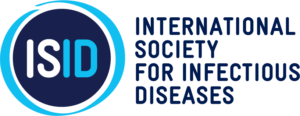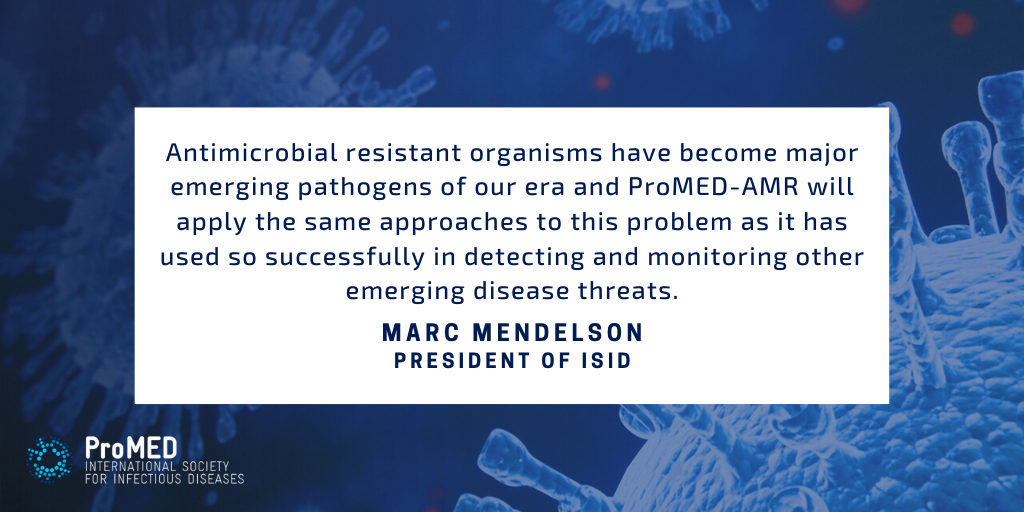The International Society for Infectious Diseases’ (ISID) Program for Monitoring Emerging Diseases (ProMED) is announcing its partnership with Public Health England (PHE), on behalf of the UK’s Department of Health and Social Care, to bolster global antimicrobial resistance (AMR) surveillance through technology transfer, monitoring and evaluation, and information exchange.
The widespread use of antimicrobials, (including their overuse in animals and humans), gaps in infection prevention and control, and inadequate disease surveillance diminishes our arsenal of tools to treat and prevent resistant infections. The goal of the partnership is to improve situational awareness surrounding AMR and empower astute practitioners with useful data. This formal collaborative project showcases the strength and reach brought together by two leading public health organizations, focusing on lower- and middle-income countries (LMICs).
PHE’s Dr. Ebere Okereke, who leads the International Health Regulation (IHR) Strengthening project, says: “Effective control of AMR is a core part of our IHR work. We are excited by this innovative partnership, to enhance our collaborative working with partners in LMICs to improve global health security”
Through this collaboration, ProMED and PHE will develop a new network called ProMED-AMR. This network will collect information on resistance trends, newly identified cases and clusters of AMR using digital disease detection methods and non-traditional information sources in all World Health Organization regions. Reports communicated via ProMED-AMR will be vetted, analyzed, and commented upon by a global team of AMR specialists. Given ProMED’s longstanding commitment to the One Health principle and information transparency, this new surveillance platform will collect reports on resistant pathogens that propagate both in, and between, humans, animals and the environment. Reports will be disseminated electronically in near real-time to an international audience of subscribers on a continuous basis. Importantly, all information will be available free of charge. Ultimately, this network will enhance global AMR recognition capabilities while safeguarding the effectiveness of antimicrobial treatments.
Marc Mendelson, President of ISID remarked, “Antimicrobial resistant organisms have become major emerging pathogens of our era and ProMED-AMR will apply the same approaches to this problem as it has used so successfully in detecting and monitoring other emerging disease threats.”
This initiative will complement the UK aid-funded Fleming Fund, which also aims to support LMICs to generate, share and use antimicrobial resistance data to improve global understanding of the scale and scope of AMR.
Dame Sally Davies, UK Special Envoy on Antimicrobial Resistance, says: “I welcome this important collaboration. We must all work together to control the spread of resistant pathogens and preserve our supplies of effective antimicrobial agents. To do so, AMR surveillance is key. This project represents an excellent addition to the AMR surveillance portfolio of work globally and nicely compliments the objectives of the Department of Health and Social Care’s Fleming Fund.”
Over the course of the next year, ISID and PHE will work together to support the global infectious disease and public health community with this new tool. Information related to program updates and the launch of the network will be posted to www.ProMEDmail.org and found on Twitter @ProMED_mail
ProMED was launched in 1994 as an Internet service to identify unusual health events related to emerging and re-emerging infectious diseases and toxins affecting humans, animals and plants. ProMED is the largest publicly available system conducting global reporting of infectious diseases outbreaks. It is used daily by international public health leaders, government officials at all levels, physicians, veterinarians and other healthcare workers, researchers, private companies, journalists and the general public. Reports are produced and commentary provided by a global team of subject matter expert (SME) moderators in a variety of fields including virology, parasitology, epidemiology, entomology, veterinary and plant diseases. ProMED operates 24 hours a day, 7 days a week and has over 81,000 subscribers, representing nearly every country in the world. ProMED staff, moderators, and team are located across 35 countries and are constantly scanning for, reviewing and posting information related to global health security. Over the last 25 years, ProMED has been the first to report on numerous major and minor disease outbreaks including SARS, MERS, Ebola, Zika and the early spread of COVID-19. ProMED is an important and longstanding contributor to the global One-health surveillance landscape.
PHE exists to protect and improve the nation's health and wellbeing, and reduce health inequalities. It does this through world-leading science, research, knowledge and intelligence, advocacy, partnerships and the delivery of specialist public health services. PHE is an operationally autonomous executive agency of the Department of Health and Social Care (DHSC). It provides government, local government, the NHS, Parliament, industry and the public with evidence-based professional, scientific and delivery expertise and support. For more information on PHE visit www.gov.uk/phe or follow us on Twitter @PHE_uk
PHE’s International Health Regulations (IHR) 2005 strengthening project is a UK DHSC Official Development Assistance (ODA) funded project. The aim is to contribute towards improved global health security by strengthening capacity and capability to comply with the IHR in selected countries and regions. The project works in 6 focal countries, Sierra Leone, Nigeria, Ethiopia, Zambia, Pakistan and Myanmar and across the African region in partnership with key regional institutions (e.g. WHO Regional Office for Africa and Africa Centre for Disease Control).

